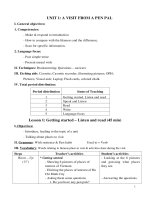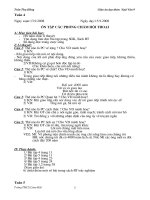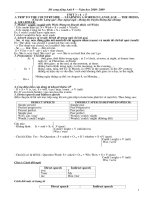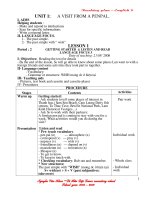Day them Anh 9 HKI
Bạn đang xem bản rút gọn của tài liệu. Xem và tải ngay bản đầy đủ của tài liệu tại đây (141.52 KB, 13 trang )
Luyện Văn Kiên Trờng THCS Cảnh Thuỵ Năm học : 2010 - 2011
Ôn tập Anh 9
Teacher s activities Student s
activities
1. Modal could with wish- clause ( Động từ tình thái could với mệnh đề wish )
Dùng để diễn tả một hành động, việc làm không thể ở hiện tại.
Ví dụ:
I wish that I could speak several foreign languages.
She wished that she could travel around the world.
I wish that you could go out with me tonight.
2. Prepositions of time: in, on, at ( giới từ chỉ thời gian: in, on, at)
a. Dùng giới từ chỉ thời gian in khi:
- Nói về mùa, tháng, năm, thập kỷ.
Ví dụ:
It is very hot in June.
I was born in 1992.
- Nói về việc gì đó phải mất bao lâu thời gian.
Ví dụ:
He can answer my questions in a few minutes.
They will leave this school in three years.
- Nói về các buổi trong ngày.
Ví dụ:
I go to school in the morning.
We do the homework in the evening.
b. Dùng giới từ chỉ thời gian on khi nói về một ngày cụ thể hay một buổi trong ngày cụ thể.
Ví dụ:
We have English on Friday.
I always go shopping on Sunday morning.
c. Dùng giới từ chỉ thời gian at với những điểm thời gian hoặc những khoảng thời gian mà đ-
ợc coi nh một điểm thời gian.
- Với những điểm chính xác của thời gian: at midday, at midnight, at 3 oclock
Ví dụ:
I sometimes hear strange voice at midnight.
She often gets up at 5 oclock.
- Với những kỳ nghỉ ngắn: Christmas, Easter, weekend
Ví dụ:
My parents often give me a present at Christmas.
We often go to the countryside at the weekend.
- Với thời gian của các bữa ăn.
Ví dụ:
This morning, at breakfast, my father told me that news.
-Với ban đêm, ngụ ý khi đêm khuya, hàng đêm
Ví dụ:
I watch football matches on TV at night.
S+ wish + (that) + S + could+ V+
Luyện Văn Kiên Trờng THCS Cảnh Thuỵ Năm học : 2010 - 2011
3. Adverbial clause of result. ( Mệnh đề trạng ngữ chỉ kết quả)
Mệnh đề trạng ngữ chỉ kết quả là mệnh đề phụ chỉ kết quả do hành động của mệnh đề
chính gây ra. Mệnh đề trạng ngữ chỉ kết quả đợc bắt đầu bằng liên từ so.
Ví dụ:
Yesterday, Lan got up late, so she was late for class.
He didnt revise the old lesson, so he got bad mark.
Exercise 1: Complete the following sentences with appropriate words from the box
below.
1. The of the world has been increasing faster and faster.
2. In Malaysia, English is a ..second language.
3. This kind of plant only grows in a .area.
4. English is a(n) .language in 44 countries in the world.
5. How often do you and your close friend .a month.
6. Foreigners are always impressed by the .Vietnamese people.
7. When he was in .schools he used to be an intelligent and active boy.
8. Vietnam has been a member country of .since 1995.
9. Our teacher the class into four groups and asked us to work in groups within five
minutes.
10. Is the ..of your country tropical?
Exercise 2: Make all the changes and additions necessary to produce meaningful
sentences from the following sets of words and phrases.
1. Malaysia/ be/ one/ countries/ Association/ South/ East/ Asia/ Nations.
..
2. Last week/ Hoa/ first/ meet/ pen pal/ that/ come/ Mexico.
..
3. Now/ she/ wish/ she/ visit/ many/ famous/ places/ Uncle Hos Mousoleum/ History
Museum/ West Lake/ Temple of literature.
4. Indonesia/ Singapore/ become/ member/ Asia/ August 8
th
/ 1967.
.
5. I/ be/ impressed/ beauty/ Nha Trang beach.
..
6. We/ arrive/ Hanoi/ 11 a.m/ this morning/ but/ I not/ phone/ you.
.
7. We wish/ weather/ be/ fine/ following days.
.
8. Vietnam/ people/ be/ very/ friendly/. Hanoi/ be/ exciting/ city/ which/ be/ always/ my mind.
Exercise 3: Give the correct tenses of the verbs in the brackets
1. They often (sit) ..next to each other when they were in secondary school.
2. We were making noise when the teacher ( come) .
3. I didnt know that you were in hospital. I ( not/ visit) you.
4. I (see) .it on my own eyes. I believed it.
compulsory divided Asean primary friendlines
population correspond climate official tropical
Luyện Văn Kiên Trờng THCS Cảnh Thuỵ Năm học : 2010 - 2011
5. I wish my parents ( stay) .with me at the moment.
6. We stayed at home because it ( rain) .very heavily yesterday.
7. I remembered ( post) to you two weeks ago.
8. He ( not/ realize) that the traffic lights (be) red. He didnt stop.
9. Yesterday (not/ be) Sunday. Today (be) ..Sunday.
10. Nice (meet) .you. Let me (introduce) ..myself. Im Mary
Exercise 4: Choose the word in each group that has the underlined, bold part
pronounced differently from the rest.
Eg: a. sky b. deny c. differently d. cry
Answer: c. differently
1. a. worker b. designer c. prefer d. farmer
2. a. fashion b. tradition c. inspiration d. question
3. a. name b. flat c. sale d. fade
4. a. minority b. logical c. slit d. tunic
5. a. worked b. designed c. stopped d. laughed
Fun corner
Why?
Which part of speech does a boiled egg belong to?
It is a noun, sir.
Very good. It is a singular or plural one?
Singular, sir.
Good, is it male or female?
It is impossible for me to give you the answer immediately, sir.
Why?
Because we must wait and see if it is a cock or a hen, sir.
Unit: 3 Reported speech( 3buổi )
(câu trực tiếp câu gián tiếp)
Period: 7+8+9
I.Aims of the lesson
By the end of the lesson, students will be able to understand direct speech and reported
speech
II.Teaching aids: posters, handout
Teacher s activities Student s activities Time
I Grammar
* Lời nói trực tiếp lad chính những từ do ngời nói đợc
lặp lại nguyên ven
* Lời nói gián tiếp là tờng thuật lại ý của ngời nói
Eg:
Luyện Văn Kiên Trờng THCS Cảnh Thuỵ Năm học : 2010 - 2011
Hoa said : I am fine
Hoa said (that) she was fine
- bỏ dấu : và
- đổi ngôi của đại từ I
she
- đổi thì của động từ am
was
- đỏi trạng ngữ t/g địa điểm nếu có
1. Đổi động từ tờng thuật , Đổi ngôi :
Ngôi I -> S1 ( i, my, me, we, our , us , )
Ngôi II -> O1 ( you . your / you )
Say to
tell sb
Said to
told sb that
Said
said that
2. Đổi thì :
( Thì lùi 1 về quá khứ )
Is / am/ are
was/ were
Will
would
Shall
should/ would
can
could
must
had to
- S + do
S + did
- S + will do
S+ would do
- S+ will be
S + would do
- S + have done
S + had done
- S + did
S + had done
- S+ can do
S + could do
- S + is/ am/ are + going ti do
S + was / were +
going to do
- S + was/were + doing
S + had been + doing
- S+ have/has + been doing
S + had been doing
3. Đổi tính từ chỉ định, phó từ chỉ thời gian,
địa điểm
- This
that
- These
those
- Here
there
- Now
then
- Today
that day ( ngày hôm đó)
- Tonight
that night( tối hôm đó)
- Ago
before ( trớc đó)
- Tomorrow
the next day( ngày hôm sau)
the following day
- Tomorrow night
the next night( tối hôm sau)
-
the following night( đêm
hôm sau)
II. Ex. Change the following from direct speech
to indirect speech
1.I like mydog Jack She said
1. She said that She liked her
dog Jock
LuyÖn V¨n Kiªn Trêng THCS C¶nh Thuþ N¨m häc : 2010 - 2011
→
2.“ I am going to the party with my brother”
→
1. “ Hoa has written me a long letter”
→
2. “ We are very tired”
→
3. “ You singing very nicely Marget”
→
4. “I have to go to the dentist tomorrow”
→
5. “ I must go to the post office before it closes”
→
6. “ Bill came to see us ytd”
→
7. Sam said “ I am sorry, I am late ”
→
8. She said “ I am working”
→
9. They said to us “ The book isn’t good”
→
10.I said “ the classes are over”
→
11.I said to him “ I have finished reading the
book”
→
12.Sam said “ I can not come to class”
→
13. My teacher said “ The entrance exam will be
difficult”
→
14. He said “ It doesn’t do any harm”
→
15.They said “ We go to the cinema once a
month”’
→
16.“I feel sick”
→
17. “ I am writing a letter”
→
18.“ I have seen that film”
→
19.“I was living in VN”
→
20.“ I shall go to Japan in August”
→
21.“ I need this book”
2. He said that he was going
to the party with his brother
3. She said that Hoa had
written him/ her a long letter
4. They said that they were
very tired
5. He told to Margaret that
she sang very nicely
6. He said that he had to go
to the dentist on the
following day
7. He said that he had to go
to the post office before it
closed
8. He said thet Bill had come
to see them the day before
9. Sam said that he was
sorry. He was late
10. She said that she was
working
11.They told us that the
book wasn’t good
12. I said that the classes
were over
13. I tolk him that I had
finished reading the book
14.He said that he couldn’t
come to class
15. My teacher told me that
the entrance exam would be
difficult
16.He said that it didn’t do
any harm
17.They said that they went
to the cinema once a month
18. He said he felt sick
19. He said he was writing a
letter
20. He said he had been
living
22. He said he would goto..
23. He said he needed that
book
24.He said he was going
then
25. He said he would do it
that day









